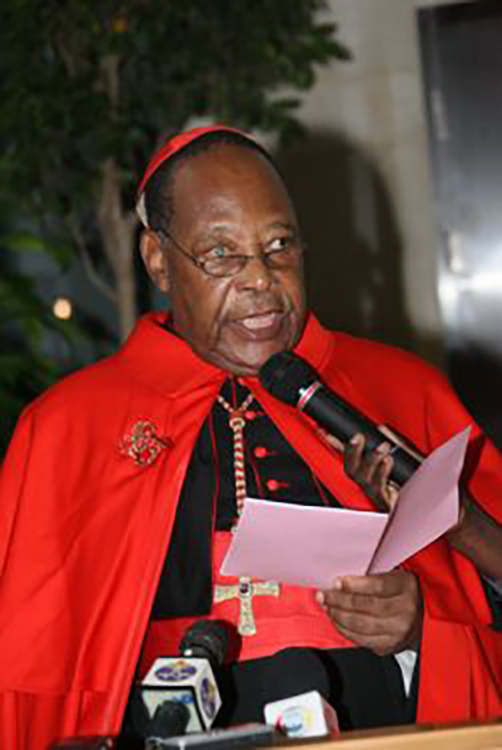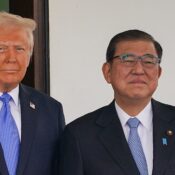
Alexandre do Nascimento, the eldest Catholic cardinal in Africa, has passed away
Cardinal Alexandre do Nascimento may have lived a very long time at 99 years old. Angola, on the other hand, is sad because he lived through most of the country’s problems, making him the longest cardinal in Africa.
He died in Luanda on Saturday after being sick for a short time. And everyone, from regular people who go to church to leaders, paid their respects to the man who became Angola’s first cardinal.
The daily newspaper Jornal de Angola, which is owned by the government, said that his career path was connected to the political history of the country while it was under colonial rule, which was marked by the fight for national freedom until it became independent.
The Catholic Church in Angola said that a service will be held to honor this great person from the country.
On Tuesday, October 8, there will be a mass at 9:30 a.m. and then he will be buried in Luanda Cathedral in the Upper Town, according to the schedule.
It made President João Lourenço sad to hear about the death of the bishop. He also said that Angola had lost one of its most distinguished sons.
In a word of condolence, President Lourenço said, “He was a good man who spent a lot of his life teaching others how to live a life of dignity, forgiveness, and respect for others.”
During his lifetime, Nascimento was an important member of the country’s main opposition party, Unita, during some of the most important events in its history. He was praised for his commitment to the causes he believed in.
Adalberto Costa Júnior, the head of Unita, said, “His service and dedication as a pastor and teacher will live on among us.”
A message from the Vatican says that he was one of the last prelates in the Roman Catholic Church who helped lead the African church into the new millennium.
In danger
But that road wasn’t easy. He was in danger while working for the Vatican, especially on October 15, 1982, when he was taken by a group of armed men during a pastoral visit. They freed him on November 16, 1982.
“During the Angelus on Sunday, October 31, Pope St. John Paul II asked for his release.”
Pope Francis told Dom Filomeno do Nascimento Vieira, the Archbishop of Luanda, in a message that he shares his “sorrow with the Angolan clergy, religious communities, all the faithful of the archdiocese, as well as with the cardinal’s family members.”
“His faith in Christ and hope in eternal life made him a brave and free man who could direct his steps for the common good. He was able to work with this Apostolic See in his love for the poor and needy as he led Caritas Internationalis,” Pope Francis said on Monday.
He is still linked to politics, helping to create the Catholic University of Angola and restarting Rádio Ecclesia, the country’s Catholic radio station.
From March 19, 1955, Radio Ecclesia has been broadcasting every day. It was taken away in 1977 and opened again in 1997.
Celso Malavoloneke, who calls himself his spiritual son, said on Sunday in a TV debate, “He was a mediator during the Angolan civil war, which began in 1975 after independence and went on until 2002.”
Aside from that, Mr. Malavoloneke said that both sides of the war knew how to listen to him.
Childhood
He was born on March 1, 1925, in Malanje Province and became one of the most important and well-known leaders of the Catholic Church in Angola. When he died, plans were already being made for the 100th anniversary events.
He was sent to the Pontifical Gregorian University in Rome to study in 1948. There, he earned a bachelor’s degree in religion and a diploma in philosophy.
In December 1952, he was made a priest.
He soon after became a professor of systematic theology at the Archdiocesan Major Seminary of the Sacred Heart of Jesus in Luanda. From 1953 to 1956, he was also the editor-in-chief of the Catholic newspaper “O Apostolado.”
In August 1975, three months before the country got its freedom from Portugal, he was made a bishop.
In 1983, Pope John Paul II made him a cardinal and admitted him to the College of Cardinals. He then became the world president of Caritas, a Catholic organization, and held that position until 1991.
Caritas’ website says that it works with the Catholic Church to help the poor and spread kindness and fairness around the world.
His job was Archbishop of Luanda from 1986 to 2001. From 1990 to 1997, he was also in charge of the Episcopal Conference of Angola and Sao Tome and Principe (Ceast).
“Even when he was old, he never forgot to remind us of this: to love Angola and the people who live there,” said Archbishop José Manuel Imbamba, president of Ceast.
As archbishop emeritus of Luanda, he took part in the conclaves that chose Pope Benedict XVI (2005) and Pope Francis (2013), but he couldn’t vote because he was too old. On March 1, 2005, he lost his right to attend conclaves.
The man who wrote more than eleven books was made an archbishop 50 years ago in August. The Catholic Church in Angola celebrated this event.
“May he rest in peace with his heavenly Father and may we all continue to be inspired by his life.” “We will always remember you in our hearts and prayers,” Mr. João Rombas wrote on his Facebook page. He is an active member of the Catholic Church in Angola.
All Categories
Recent Posts
Tags
+13162306000
zoneyetu@yahoo.com



